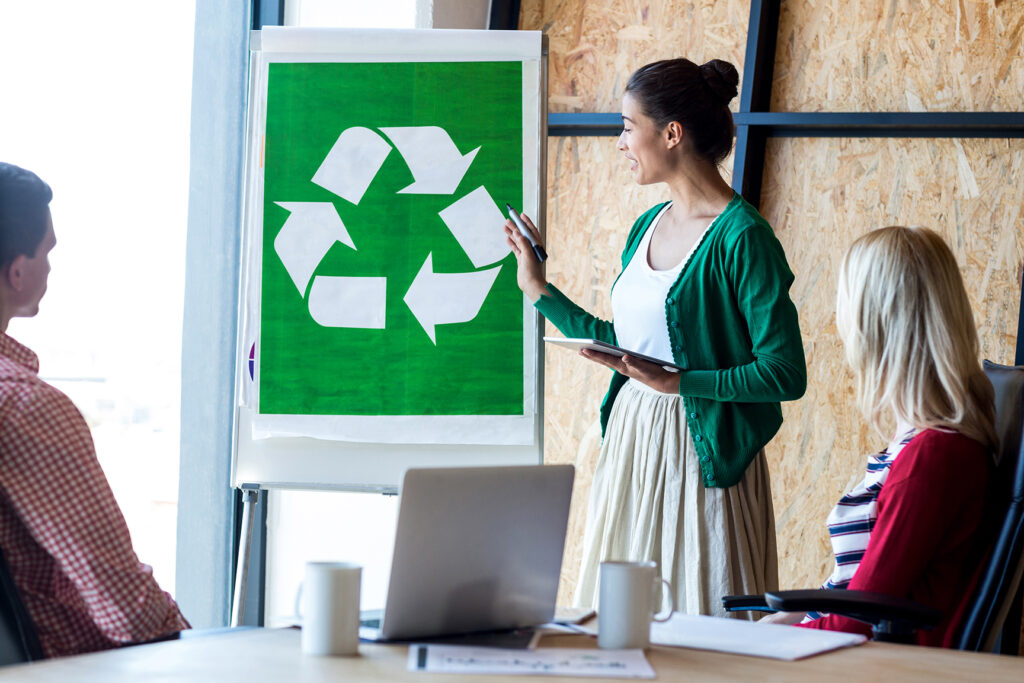The entire hospitality industry is built around comfort. When travelers stay in a hotel, they expect clean rooms, unlimited hot water, fast WiFi, etc. The term “staycation” has become increasingly popular in recent years as a way to describe staying in a hotel in your hometown simply for the pleasure of the comfort it offers over a night spent at home. There are no chores to be done, the bed has been made, and towels come freshly laundered and folded.
Such comfort doesn’t come without an impact on the environment. Because hotel rooms are cleaned before every stay, and hotels tend to provide as many added amenities as needed for guest satisfaction, this can lead to waste and excess use of water and electricity. As modern accommodations have realized the importance of being environmentally conscious, they continue to take steps to reduce their environmental impact while still maintaining guest satisfaction.

As Needed Services
Historically, hotels service rooms daily unless instructed otherwise by the guest. This means swapping out towels, re-stocking toiletries, and making the bed – sometimes changing these linens as well. Daily cleaning service is not only labor-intensive and requires a highly motivated housekeeping team. But, performing these tasks every day throughout a visit also adds to the carbon footprint of each guest stay.
Realizing this, many hotels have switched to offering these services as needed. This simply means that if a guest requests extra linens or a room cleaning, those are provided. However, if a day comes where such services are not necessary, housekeeping doesn’t perform a turndown and cleaning service. This is especially impactful when a person is traveling alone, as they likely need less from housekeeping throughout their stay. Generally, if service is requested, it is performed free of charge as in traditional stays. But, some hotels have added a fee for this to encourage guests to only request when necessary. An alternative to this new method is an every-other-day option. Hotels using this method of service offer room cleanings on alternating days for guests staying longer than two nights.
Reduction of Single-Use Plastics
Most hotel guests have snagged a bottle or two (or maybe more) of the individual-sized toiletries provided in hotel bathrooms. Especially when these are replaced daily by staff, guests often stock their suitcases with the mini bottles of shampoo and conditioner for use on later trips. While these containers are convenient for travel, they certainly are not environmentally friendly. They are rarely recycled and because of their size, one bottle only lasts a couple of showers. To reduce waste, many hotels switched over to mounted refillable dispensers for their soap and shower products. This has the added benefit of reducing costs for hotels as well. Individually packaged items are almost always more expensive than their refillable counterparts.
Another way hotels reduce their use of single-use plastics is by providing multi-use, washable glassware over plastic or paper cups for water and coffee. Similarly, for hotels offering a breakfast buffet, opting for refillable containers over single-serve is becoming increasingly popular. Cereal, juices, milk, and other items traditionally handed out in single packages are now served in refillable jars or dispensers.
Reduced Electricity Consumption
Thinking about hundreds of guests constantly changing their room temperature, flipping on lights, and charging their electronics, you can imagine the amount of electricity consumed in a hotel is pretty significant. However, there are ways to reduce this without much of an effect on guest satisfaction. Hotels switching to LED lightbulbs in their rooms and public spaces save a ton of energy (and money in the long-term as these bulbs last years rather than months). Also, many hotels in traditionally sunny parts of the country are making the switch to solar energy for some or all of their electricity needs. Solar panels can not only power the lights in the buildings, but other electricity consumers such as heated pools, gym equipment, and business center electronics.
Changes to the Reception Desk
While reception doesn’t seem to be a very wasteful aspect of a hotel, the amount of paper used here exceeds that used anywhere else in a hotel. Luckily, advancements in technology and software make traditional activities that use paper doable electronically. Many hotels now offer (or require) electronic invoicing and payment. Hotels now deliver that paper bill that appears under the door on checkout day via text or email instead. Doing so saves paper that is likely to be trashed. For those activities that still require a physical piece of paper, double-sided printing is a way to at least halve the amount of paper consumed.
Staff Responsibilities for Maintaining Environmentally Conscious Hotels
No matter the number of changes a hotel implements to reduce its environmental impact, they must educate and onboard with the changes for them to be successful. Just like training in guest satisfaction, training in regards to environmental policies is crucial for a hotel to operate sustainably.
As an employee or potential employee of an establishment, ask about the hotel’s priorities regarding remaining environmentally conscious if you are curious. Managers often value employees who strive to reduce the hotel’s impact, as this generally leads to cost savings as well.
If you’re looking for your next role in hospitality, our updated database of current openings is a great place to start. We’ve got roles in a variety of areas, so there is sure to be one that fits your skills and interests. While it requires hard work and dedication, a career in hospitality is an opportunity to make someone’s day a bit better – every single day.


